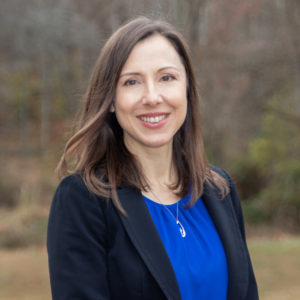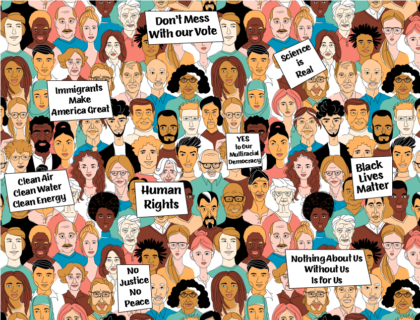Social Justice Activist Roundtable
I Can’t Be The Change On My Own

Today we face mountains of trouble in the world, from voter suppression, to a global pandemic, to humanitarian crises, to environmental devastation, and more. You may wonder how to build more engagement with your issue, or how to sustain efforts, amid so many competing cries for justice. Yet, even if the mountain of crises weren’t as high, we still would not bring justice on our own. Many realize that coalition-building is central to promoting any justice agenda. However, connecting with new partners, developing funding, and growing and sustaining engagement among volunteers present perpetual challenges to justice work. As Ralph Waldo Emerson said, “to face the mountain, we must face and overcome the pebbles in our way.” Our pebbles are embedded in the way we imagine justice work. To overcome them, we can draw on the science of social movements and reorient ourselves to the journey for justice. We can harness the power of framing, which shapes how we view a situation and communicate an issue. We can develop skills to build transformative relationships that drive change. We can learn to notice the opportunities that arise through such relationships. In this way, together, we become the change that overgrows the mountain.
Register Here
2021 Social Justice Activist Roundtable
Saturday, November 20, 2021
1pm ET | 12noon CT | 11am MT | 10am PT
| 1:00 pm | Welcome by Pablo DeJesus, Exec. Director |
| 1:15 pm | Keynote address by Rev. Dr. Pipping Whitaker |
| 2:00 pm | Social Justice Program Breakout Sessions
|
| 3:10 pm | Break (10 minutes) |
| 3:20 pm | Guided Discussion Sessions on Social Justice topics
Topics such as:
Each facilitated session will include presentation (10 minutes), discussion (25 minutes), and capture of key points for report out (10 minutes) during plenary session |
| 4:05 pm | Plenary Session for all Meeting Participants (55 minutes) |
- – # – # –
Guided Discussion – SAMPLE QUESTIONS – To Stimulate Thinking And Preparations:

- Congregational Engagement and Accountability in Social Justice:
- How do you invite and engage members of your congregation to engage in social justice?
- How does your congregation determine its social justice priorities?
- How does your congregation participate in loving accountability–such as sharing successes and challenges, noticing and sharing opportunities for growth?
- Who provides feedback to (or within) your congregation so that social justice efforts may grow and evolve in relationship with those experiencing injustice?
- Congregational Social Justice Outreach and Relationships:
- How does your congregation conduct social justice outreach and develop relational partnerships, and with what groups/communities?
- How does your congregation nurture relationships with outside groups that permit open constructive dialogue and mutuality?
- Who (what groups/organizations) does your social justice mission impact?
- What is the nature of your congregation’s relationship to impacted groups (could be: mutual, one-way, negative, fraught, joyful, unknown….you name it!) What and how do external groups impact your ability to accomplish your mission?
- Sustainability for Social Justice Activities:
- How does your congregation raise and allocate funding support for social justice?
- Are you adequately funded to accomplish your priorities?
- What is the congregation’s sense of ownership for social justice activities (as a whole or specifically)?
- How do you communicate the mutuality of benefit from social justice activities to the congregation and the wider community?
- What are your social justice leadership succession and co-leadership strategies?
- How flexible are your social justice structures and policies to adapt to rapid change?

